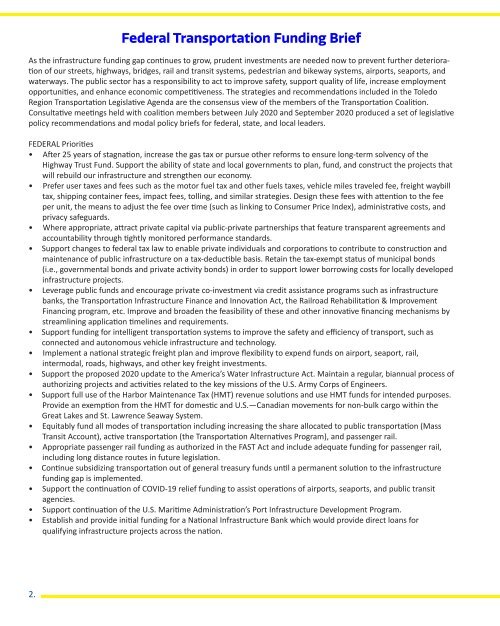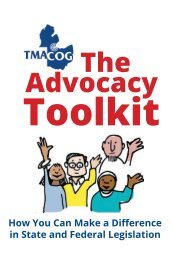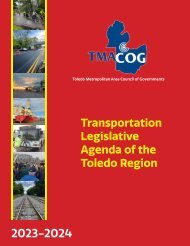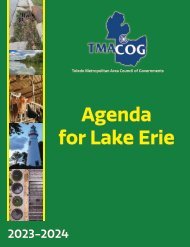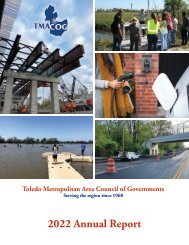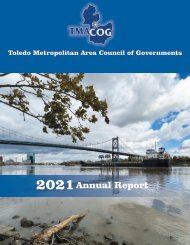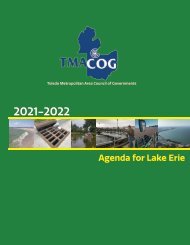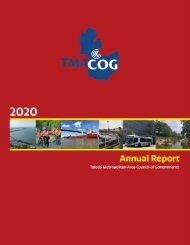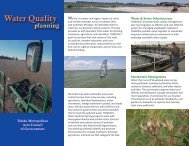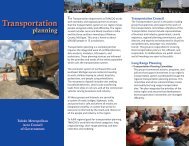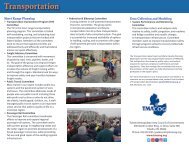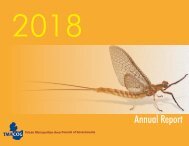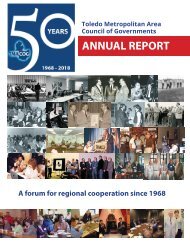2021-2022 TMACOG Transportation Legislative Agenda
2021-2022 TMACOG Transportation Legislative Agenda
2021-2022 TMACOG Transportation Legislative Agenda
Create successful ePaper yourself
Turn your PDF publications into a flip-book with our unique Google optimized e-Paper software.
Federal <strong>Transportation</strong> Funding Brief<br />
As the infrastructure funding gap continues to grow, prudent investments are needed now to prevent further deterioration<br />
of our streets, highways, bridges, rail and transit systems, pedestrian and bikeway systems, airports, seaports, and<br />
waterways. The public sector has a responsibility to act to improve safety, support quality of life, increase employment<br />
opportunities, and enhance economic competitiveness. The strategies and recommendations included in the Toledo<br />
Region <strong>Transportation</strong> <strong>Legislative</strong> <strong>Agenda</strong> are the consensus view of the members of the <strong>Transportation</strong> Coalition.<br />
Consultative meetings held with coalition members between July 2020 and September 2020 produced a set of legislative<br />
policy recommendations and modal policy briefs for federal, state, and local leaders.<br />
FEDERAL Priorities<br />
• After 25 years of stagnation, increase the gas tax or pursue other reforms to ensure long-term solvency of the<br />
Highway Trust Fund. Support the ability of state and local governments to plan, fund, and construct the projects that<br />
will rebuild our infrastructure and strengthen our economy.<br />
• Prefer user taxes and fees such as the motor fuel tax and other fuels taxes, vehicle miles traveled fee, freight waybill<br />
tax, shipping container fees, impact fees, tolling, and similar strategies. Design these fees with attention to the fee<br />
per unit, the means to adjust the fee over time (such as linking to Consumer Price Index), administrative costs, and<br />
privacy safeguards.<br />
• Where appropriate, attract private capital via public-private partnerships that feature transparent agreements and<br />
accountability through tightly monitored performance standards.<br />
• Support changes to federal tax law to enable private individuals and corporations to contribute to construction and<br />
maintenance of public infrastructure on a tax-deductible basis. Retain the tax-exempt status of municipal bonds<br />
(i.e., governmental bonds and private activity bonds) in order to support lower borrowing costs for locally developed<br />
infrastructure projects.<br />
• Leverage public funds and encourage private co-investment via credit assistance programs such as infrastructure<br />
banks, the <strong>Transportation</strong> Infrastructure Finance and Innovation Act, the Railroad Rehabilitation & Improvement<br />
Financing program, etc. Improve and broaden the feasibility of these and other innovative financing mechanisms by<br />
streamlining application timelines and requirements.<br />
• Support funding for intelligent transportation systems to improve the safety and efficiency of transport, such as<br />
connected and autonomous vehicle infrastructure and technology.<br />
• Implement a national strategic freight plan and improve flexibility to expend funds on airport, seaport, rail,<br />
intermodal, roads, highways, and other key freight investments.<br />
• Support the proposed 2020 update to the America’s Water Infrastructure Act. Maintain a regular, biannual process of<br />
authorizing projects and activities related to the key missions of the U.S. Army Corps of Engineers.<br />
• Support full use of the Harbor Maintenance Tax (HMT) revenue solutions and use HMT funds for intended purposes.<br />
Provide an exemption from the HMT for domestic and U.S.—Canadian movements for non-bulk cargo within the<br />
Great Lakes and St. Lawrence Seaway System.<br />
• Equitably fund all modes of transportation including increasing the share allocated to public transportation (Mass<br />
Transit Account), active transportation (the <strong>Transportation</strong> Alternatives Program), and passenger rail.<br />
• Appropriate passenger rail funding as authorized in the FAST Act and include adequate funding for passenger rail,<br />
including long distance routes in future legislation.<br />
• Continue subsidizing transportation out of general treasury funds until a permanent solution to the infrastructure<br />
funding gap is implemented.<br />
• Support the continuation of COVID-19 relief funding to assist operations of airports, seaports, and public transit<br />
agencies.<br />
• Support continuation of the U.S. Maritime Administration’s Port Infrastructure Development Program.<br />
• Establish and provide initial funding for a National Infrastructure Bank which would provide direct loans for<br />
qualifying infrastructure projects across the nation.<br />
2.


